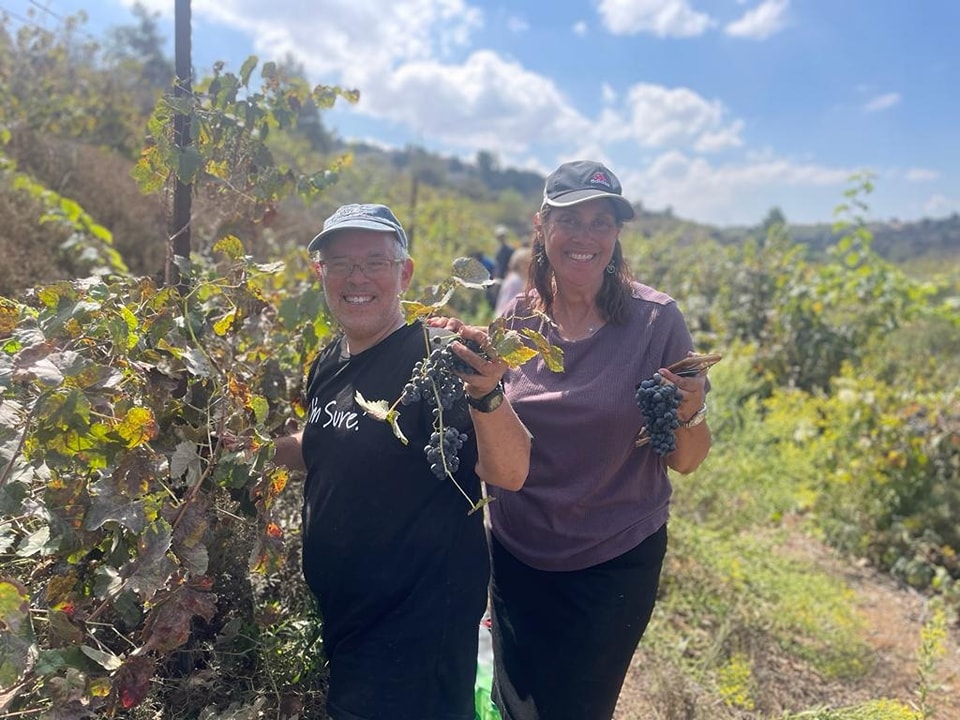No individual or industry in Israel has been immune to the war that Hamas started on October 7 that killed more than 1,300 civilians in Israel and injured thousands more. The grotesque brutality and the barbarism of Hamas’ attack targeting children, families and the elderly on Shabbat Simchat Torah is burned into the memories of every citizen, as well as virtually every Jew worldwide. Business activities in all industries are very much operating on skeleton staffs as almost every active duty soldier and reservist has been called up.
Israel’s vibrant $50 million export wine industry is reeling. Many individual winemakers, viticulturists, staff or family members were suddenly called up to serve, leaving some grapes on the vine and much wine in vats within one to three weeks following harvest. Those left behind are working double time, often with other jobs as well, to keep things running and to keep the home fires burning while their colleagues and loved ones are away protecting border communities and going to war.
Eli Shiran, owner/winemaker of Shiran Winery in Kiryat Arbeh, has been personally affected by the brutal fighting. He is mourning his nephew Ori Shani, H”YD, who died on Shabbat Simchat Torah during the fighting while serving as an officer in the Gaza Strip. Shani, only 22 years old, is survived by a young wife and a four-month-old baby. He and his team were heralded for their incredible bravery, and he is credited with saving the lives of many and neutralizing between 35 and 70 terrorists in the aftermath of the Simchat Torah attack.
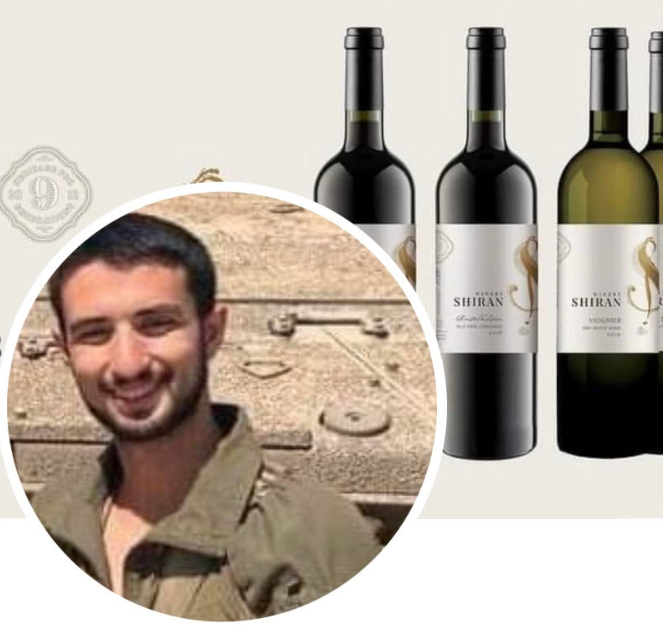
In Shani’s honor, Shiran is raising money for his son Shlomo’s unit in Netzach Yehuda, which allows haredi soldiers to serve in the IDF in accordance with haredi minhagim and their needs as haredi people. The men who serve in this unit are generally from families who oppose military service, so the soldiers need extra support and additional training. “The fund was established by a number of rabbis from the haredi community who understood the value and importance of enrolling haredi men who are not learning Torah day and night in yeshivot and the yeshiva world does not suit them,” Shiran said.
The fund is run at present by charedim who have graduated from the unit and embraced this sacred mission. Shiran asks that anyone who would like to donate, to please specify that your donation is for the Ori Shani fund. https://www.nahalharedi.org/israelatwar.
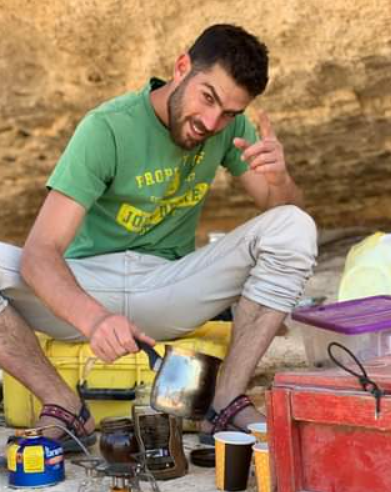
Alex Haruni, CEO of Dalton Winery in the Upper Galil, wrote to his friends and customers in the week following the initial attack, which he referred to as “Black Shabbat.”
“We are still burying and mourning for our dead. Our sons and daughters have all been conscripted to the fronts in both the South and the North. There is not a single family in Israel that has not been touched by these events.
Haruni shared his perspective on the thousands of families which have been displaced from their homes and are living in temporary accommodation. “No one is going out, businesses that want to work have no staff, restaurants are mainly closed and just helping to prepare meals for soldiers all over the country, and while there is a huge communal spirit, everyone is looking for the opportunity to volunteer to help our soldiers there is very little economic activity.
“I would like to suggest a simpler way to help us in Israel, something you can do every day that will come at little or no [extra] personal cost. Please buy Israeli products whenever possible. Try to ensure that every day when you sit down to eat you have an Israel product or two on your dinner table and if you are drinking wine then it should be an Israeli wine. That is the support we will need in the long run, that is the support we will need to keep our businesses running here and for you to continue to enjoy the brands you have loved for ages.”
Etti Edri of Carmel Winery and its Negev-based boutique label, Yatir Winery, has shared the shock of the unprecedented loss of many children and teens in the southern communities. “Please pray for the safe return of our kidnapped innocent babies, children, women and men and elderly.
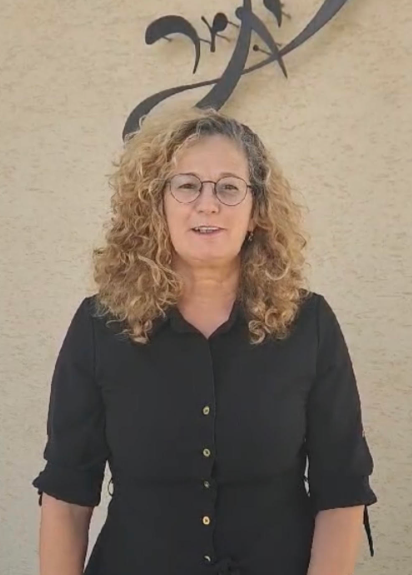
“We all face difficulties and uncertainties that will undoubtedly be etched in history books. Yet, amidst the adversity, we have witnessed a remarkable sense of unity and an unwavering desire to contribute to our beloved nation’s well-being,” Edri said.
Edri shared that Carmel’s 250 employees and their families are dependent on the winery for their livelihood and urges everyone to buy Israeli wine to support these families through this very rough time.
“The backup support from the United States has been very uplifting. Right now it’s the time for us to contribute in any way we can. Harvesting and working at the winery has to continue; luckily we finished the harvesting before Sukkot. We are considered an essential factory. Everyone who knows Carmel knows we are 140 years old and have had 140 consecutive vintages. We will continue. This brought terrible times but also there is good with it. ‘Kuma,’ everyone knows it’s now time to get up and fight.”
Edri shared that Carmel’s viticulturists and staff were called up early, to protect the Gaza border and also up north. “We want them to go to protect but also for them to come back home, safe, tzetzchem l’shalom.”
“If you ask where you think we should give, it’s very personal; everyone needs to give from his own heart. First and foremost, the surviving families from the Otef Aaza, who are expecting a long recovery and rebuild. Secondly, IDF צה”ל, needs all necessary equipment.I am sharing this link (https://www.jgive.com/new/en/usd/donation-targets/110701) to collect $28,000 for 500 soldiers to have polarized photo-ceramic glasses to protect their eyes from bullet residue as they shoot.”
Rikva Baum, of Family Baum Winery in Efrat, is business partners with her husband Sam in a garagiste (small scale) winery operation. Sam was called down south on Simchat Torah to his role as a reserve commander in a combination tank and combat unit. As he had to leave just as the wine was beginning fermentation and the thick fermentation cap (consisting of grape skin and stems) needed to be punched down daily, she began documenting her experiences on Instagram initially in a series called “Diaries of a punch down girl.” As fermentation concluded, she transitioned to a series this week called “Winemaking at war.”
The British olim are in their third year of making wine, having made 400 bottles last year. Sam Baum has a day job working as a vintner at another winery in the Judean Hills. Rivka too has a day job, working as a nurse at Shaare Zedek Medical Center, and is relying on assistance from her and Sam’s parents to help watch their son as she takes shifts in her internal medicine ward in addition to covering the wine work.
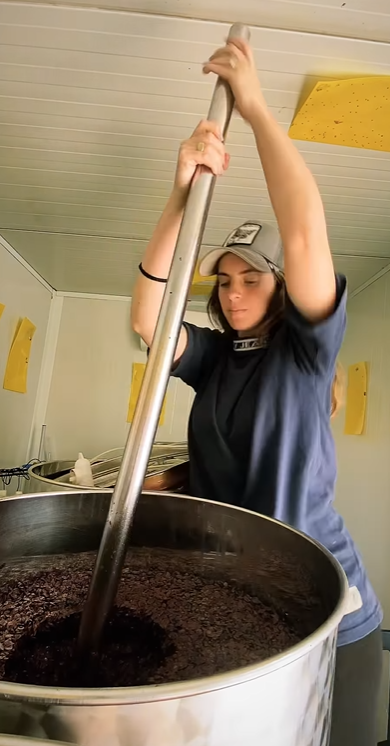
The Baums’ fall 2023 harvest, just completed on Erev Sukkot, was to be the winery’s largest yet. With help, they handpicked 700 kilos of cabernet sauvignon and petit verdot grapes from their current location on land owned by the Cramim Hotel, in a vineyard that is not harvested because the grapes are grown at a 90-degree angle.
While Rivka jokingly told Sam she could handle the winemaking this year, she really only expected to assist with the punch down process. However, things have quickly gotten more real as the wine now has to be tested for sugar and alcohol levels and the next steps in wine production must take place. “Michal Kalisher, who used to work at Castel Winery in the lab, messaged me and offered to help, so I am sending my results to her,” she explained. Sam texts and shares directives when he can.
In the coming years, Family Baum Winery plans to move from their location in Yehuda and Shomron to an estate in Shaal in the Golan Heights, and is working with investors to make this dream a reality. “I hope that the war will not delay our plans,” Rivka said.
Rivka also shared that residents in her yishuv in Efrat are working together with each other to make sure that the reservists and other IDF families are getting what is needed. She also said the clothing designer Daniella Faye is publicizing how to give funds on an Instagram account that directly delivers pizza and other items to community members who are managing the front from home in Efrat. She also recommends the following organization that is helping families in her community: https://justonechesed.org/aid4israel/.
Amichai Lourie of Shiloh Winery in Shomron has been working around the clock since before the war began on the harvest and shared his personal devastation at the effects of the horrific attacks. He noted he had felt a strong pull that this would happen for many years. With that in mind, he built his new winery and visitor’s center with 100% Jewish labor, because he was sure that devastation of this type was coming. “Why should we pay an Arab worker who is then going to buy weapons and kill me?” he asked.
Lourie said that all but two workers in the winery have gone off to serve, and that the fall is a particularly busy time; they had yet to complete the harvest when the war began. He said that 10% of the fruit was still on the vine and the team of volunteers were stopped from harvesting last week due to rocket attacks.
Lourie was also mourning the loss of a harvest partner from a farm where they harvested together on Erev Yom Kippur. “Amazing guy, Orush, you have to see this farm. I feel now as if I did something wrong that I took up some of his time talking to him when maybe I should have shut up and let him talk to his brothers and sisters. He was killed on Simchat Torah.”
Shiloh Winery had also adopted an elite army unit that has come to the winery to unwind and relax after various operations over the past 15 years. “This is a unit you will never hear of, and it takes 15 years of training just to get into it. They lost nine guys. Nine guys! You will never see their names or hear their stories. I can’t explain to you what these guys did,” Lourie said.
“Most people don’t or won’t ever know how terrible this is and how crazy things are. The major difference between now and the Holocaust is that finally we can fight back, we don’t have to run away. We got kicked out of England, Portugal, Spain, pogroms around the world and we all just buried our dead and moved along. This time finally we can fight back. God willing we will prevail. Eventually we will win.”
Lourie shared that before giving charity to Israel, before people from Chutz La’Aretz come to pick fruit or help run businesses while their owners are at war, to prevent them from collapsing, he wants them to wake up and share with elected officials and everyone to make sure they know what happened on October 7, 2023.
“The charity that I help—they have been putting up special kinds of fences and alarms—is One Israel Fund [https://oneisraelfund.org]. For me this is the number one by far the most aware charity there is. The best thing about the charity is you can pick what campaign you want to contribute to. Every cent goes to the charity. But before you write a check, wake up!”
